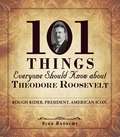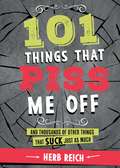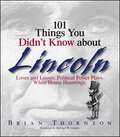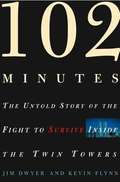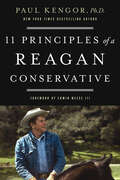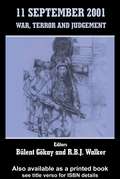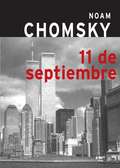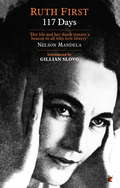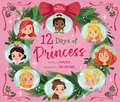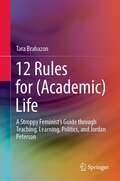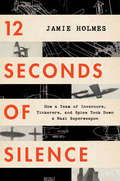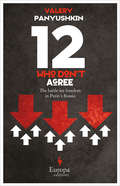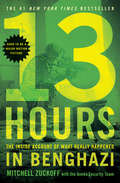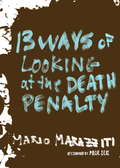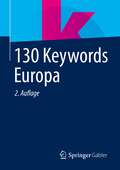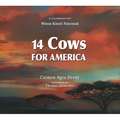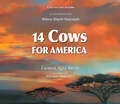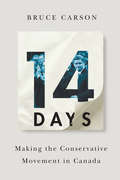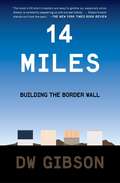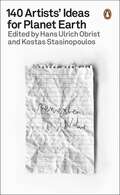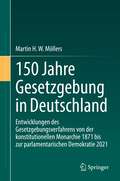- Table View
- List View
101 Things Everyone Should Know about Theodore Roosevelt: Rough Rider. President. American Icon.
by Sean AndrewsThe inside story of Teddy's life and presidency!You probably know that Theodore Roosevelt was the 26th president of the United States, but did you also know that he suffered great bouts of homesickness? Or that he carried a vial of morphine at all times in case he ever needed to take his own life?Though the image of President Theodore Roosevelt is one of fringed suede jackets and wire circles of glass framing a serious and scowling face, the man behind this image was a spectacularly intelligent and complex individual. 101 Things Everyone Should Know about Theodore Roosevelt explores the nuances of his famous life, giving little-known facts that complete the picture of Theodore Roosevelt. From his crippling childhood to his involvement with the Rough Riders, this book celebrates the American icon whose beliefs are still riveting almost 100 years after his death.
101 Things I Learned® in Urban Design School (101 Things I Learned)
by Matthew Frederick Vikas MehtaProviding unique, accessible lessons on urban design, this title in the bestselling 101 Things I Learned® series is a perfect resource for students, recent graduates, general readers, and even seasoned professionals. Students of urban design often find themselves lost between books that are either highly academic or overly formulaic, leaving them with few tangible tools to use in their design projects. 101 Things I Learned® in Urban Design School fills this void with provocative, practical lessons on urban space, street types, pedestrian experience, managing the design process, the psychological, social, cultural, and economic ramifications of physical design decisions, and more. Written by two experienced practitioners and instructors, this informative book will appeal not only to students, but to seasoned professionals, planners, city administrators, and ordinary citizens who wish to better understand their built world.
101 Things That Piss Me Off: And Thousands of Other Things That Suck Just As Much
by Herb W. ReichComplaining, psychologists assert, is good for your health. It acts as a relief valve to help dispel the pent up energy generated by our daily frustrations, personal peeves, and life-long vexations. Now curmudgeons, gripers, grousers, and complainers have their own place to discard their tension! 101 Things That Piss Me Off is the manifesto guaranteed to help even the crabbiest soul let loose. Here is just a sample list of items guaranteed to piss anyone off:•Aggressive drivers who give the finger•People who graduated from assertiveness courses•Elevator music•Having the best senators money can buy•Appliances that fail the day after the warranty expires•Nineteen-year-old tech millionaires•People who are more inept than we give them credit for
101 Things You Didn't Know About Lincoln: Loves And Losses! Political Power Plays! White House Hauntings!
by Brian ThorntonDiscover the man behind the myth.One hundred fifty years after his death, Abraham Lincoln remains one of America's most fascinating, brilliant, and visionary leaders. He's idolized as a hero, a legend, and even a secular saint. But what about the real man behind the stone monument?In this engaging, intelligent book, you'll learn about more than just his savvy political skills and Civil War power plays. 101 Things You Didn't Know about Lincoln reveals other little known details of his personal and professional life, including:How Lincoln escaped death more than once as a childWhy he once used a chicken bone to argue a court caseWhy the Lincolns kept goats at the White HouseWhen and why he grew that beardHow John Wilkes Booth's brother saved Lincoln's sonWho tried to rob Lincoln's graveFilled with these and other offbeat facts, 101 Things You Didn't Know about Lincoln is sure to fascinate, whether you're a newcomer to Lincoln legend and lore, or a hardcore history buff!
102 Minutes: The Untold Story of the Fight to Survive Inside the Twin Towers
by Jim Dwyer Kevin FlynnAt 8:46 am on September 11, 2001, 14,000 people were inside the twin towers-reading e-mails, making trades, eating croissants at Windows on the World. Over the next 102 minutes, each would become part of a drama for the ages, one witnessed only by the people who lived it-until now. <P><P> Of the millions of words written about this wrenching day, most were told from the outside looking in. New York Times reporters Jim Dwyer and Kevin Flynn have taken the opposite-and far more revealing-approach. Reported from the perspectives of those inside the towers, 102 Minutes captures the little-known stories of ordinary people who took extraordinary steps to save themselves and others. Beyond this stirring panorama stands investigative reporting of the first rank. An astounding number of people actually survived the plane impacts but were unable to escape, and the authors raise hard questions about building safety and tragic flaws in New York's emergency preparedness. <P><P> Dwyer and Flynn rely on hundreds of interviews with rescuers, thousands of pages of oral histories, and countless phone, e-mail, and emergency radio transcripts. They cross a bridge of voices to go inside the infernos, seeing cataclysm and heroism, one person at a time, to tell the affecting, authoritative saga of the men and women-the nearly 12,000 who escaped and the 2,749 who perished-as they made 102 minutes count as never before. 102 Minutes is a 2005 National Book Award Finalist for Nonfiction.
11 Principles of a Reagan Conservative
by Paul KengorPerhaps no other president's name is invoked by politicians as much as Ronald Reagan's. Every election, as presidential hopefuls jockey for the Republican nomination, each one claims to be a Reagan conservative. But are these candidates truly carrying on the mantle of Ronald Reagan, or are they abusing the memory of our great president? What did Ronald Reagan really believe? In 11 Principles of a Reagan Conservative, biographer Paul Kengor analyzes Ronald Reagan's speeches and actions to paint a full, accurate picture of his beliefs. Kengor identifies these principles that lie at the crux of Reagan's conservatism; Freedom, Faith, Family, Sanctity and Dignity of Human Life, American Exceptionalism, The Founders' Wisdom and Vision, Lower Taxes, Limited Government, Peace Through Strength, Anti-Communism, and Belief in the Individual. And it is through these principles that Reagan's modern emulators may create a successful, conservative future.Many a politician has asked: What would Reagan do if he were president now? Where would Reagan stand on today's issues? Who is the next Ronald Reagan? Paul Kengor dissects Reagan's presidency and provides decisive conclusions. The answers to some of these questions may surprise conservatives and liberals alike.
11 September 2001: War, Terror and Judgement
by Bülent Gökay R.b.j.walkerIn a comprehensive study of the world since September 11th, 2001, the contributors to this volume offer a series of perspectives on current security trends. The scholars who participated in this study are from Europe, North America and Asia.
11 de Septiembre (Open Media Series)
by Noam ChomskyEn 11 de septiembre Noam Chomsky disecciona las causas de raíz de la catástrofe del 11 de septiembre, sus precedentes históricos, y las posibles consecuencias mientras el mundo se mueve hacia la realidad de después del 11 de septiembre.
117 Days: An Account of Confinement and Interrogation under the South African 90-Day Detention Law (Virago Modern Classics #139)
by Ruth FirstIn prison you see only the moves of the enemy. Prison is the hardest place to fight a battle.'117 Days is Ruth First's personal account of her detention under the iniquitous '90-day' law of 1963. There was no warrant, no charge and no trial - only suspicion.This sparsely written and unique record tells of her experiences of solitary confinement, constant interrogation and instantaneous re-arrest on release - lightened by humorous portraits of governors, matrons, wardresses and interrogators, seen as the tools of the police state.
117 Days: An Account of Confinement and Interrogation under the South African 90-Day Detention Law (Vmc Ser. #483)
by Ruth FirstIn prison you see only the moves of the enemy. Prison is the hardest place to fight a battle.'117 Days is Ruth First's personal account of her detention under the iniquitous '90-day' law of 1963. There was no warrant, no charge and no trial - only suspicion.This sparsely written and unique record tells of her experiences of solitary confinement, constant interrogation and instantaneous re-arrest on release - lightened by humorous portraits of governors, matrons, wardresses and interrogators, seen as the tools of the police state.
12 Days of Princess
by Holly P RiceAn adorable Disney Princess holiday picture book inspired by the classic carol, "The Twelve Days of Christmas." Inspired by the famous song “The Twelve Days of Christmas,” a new holiday tradition is here: the twelve days of princess! Countdown to Christmas with Tiana, Rapunzel, Merida, Cinderella, Belle, Aurora, Snow White, and Ariel. Each day brings a new magical gift, like two glass slippers or seven singing dwarfs, from one of your favorite Disney Princesses to help get you into the holiday spirit. Sing-along to the melody of The Twelve Days of Christmas The perfect bedtime story read-aloud for the holiday seasonCountdown to Christmas with your favorite Disney charactersComplete your story book collection with these fan-favorite, best sellers: Disney Christmas Storybook CollectionDisney Halloween Storybook CollectionDisney Countdown to Christmas5 Minute Girl Power Stories5 Minute Princess StoriesDisney Princess Storybook Collection
12 Rules for (Academic) Life: A Stroppy Feminist’s Guide through Teaching, Learning, Politics, and Jordan Peterson
by Tara BrabazonThese are strange times. Climate crises. Health crises. Collapsing systems. Influencers. And yes - Jordan Peterson.We are currently living in a (Post) Peterson Paradigm. This book – 12 Rules for (Academic) Life - explores what has happened to teaching, learning and politics through this odd and chaotic intervention. Deploying feminism, this lens and theory offers a glass-sharpened view of this moment in international higher education. It is organized through twelve mantras for higher education in this interregnum, and offers new, radical, edgy and passionate methodologies, epistemologies and ontologies for a University sector searching for a purpose. This is a feminist book which targets a feminist audience, both inside and outside higher education. It presents a clear focus on how this Peterson moment can be managed and challenged, when in future such academics deploy social media in this way. This book is also a part of higher education studies, exploring the role of the public / critical / dissenting / organic intellectual in debates about the political economy, identity/politics and leadership.A question of our time – through a climate emergency, a pandemic and polarized politics – is why Professor Jordan Peterson gained profile and notoriety. The Jordan Peterson moment commenced in September 2016 with his YouTube video, “Professor against political correctness,” and concluded with his debate with Slavoj Zizek on April 19, 2019. From this moment, his credibility was dented, if not destroyed.Jordan Peterson infused scholarly debates with Punch and Judy extremism and misunderstandings. Instead, this book offers research rather than certainty, interpretation rather than dogma, evidence rather than opinion, and theory rather than ‘moral truth.’ The goal is to recalibrate this (Post) Peterson Paradigm, to take stock of how this moment occurred, and how to create a revision of higher education.
12 Seconds of Silence: How a Team of Inventors, Tinkerers, and Spies Took Down a Nazi Superweapon
by Jamie HolmesThe riveting story of the American scientists, tinkerers, and nerds who solved one of the biggest puzzles of World War II—and developed one of the most powerful weapons of the war 12 Seconds of Silence is the remarkable, lost story of how a ragtag group of American scientists overcame one of the toughest problems of World War II: shooting things out of the sky. Working in a secretive organization known as Section T, a team of physicists, engineers, and everyday Joes and Janes took on a devilish challenge. To help the Allies knock airplanes out of the air, they created one of the world&’s first &“smart weapons.&” Against overwhelming odds and in a race against time, mustering every scrap of resource, ingenuity, and insight, the scientists of Section T would eventually save countless lives, rescue the city of London from the onslaught of a Nazi superweapon, and help bring about the Axis defeat. A holy grail sought after by Allied and Axis powers alike, their unlikely innovation ranks with the atomic bomb as one of the most revolutionary technologies of the Second World War. Until now, their tale was largely untold. For fans of Erik Larson and Ben Macintyre, set amidst the fog of espionage, dueling spies, and the dawn of an age when science would determine the fate of the world, 12 Seconds of Silence is a tribute to the extraordinary wartime mobilization of American science and the ultimate can-do story.
12 Who Don't Agree: The Battle for Freedom in Putin's Russia
by Valery Panyushkin&“Portraits of a group of mostly young Muscovites . . . Some of [Panyushkin&’s] sketches are political fables of inspiring selflessness and courage&” (Star Tribune). In Twelve Who Don&’t Agree, journalist Valery Panyushkin profiles twelve Russians from across the country&’s social spectrum, including: a politician, a journalist, an army officer, an author, a bank manager, a laborer, and a university student. Despite varied backgrounds, they all have one thing in common: participation in 2007&’s historic March of the Dissidents. Though each of these men and women had personal reasons for joining the demonstration, they shared a belief that the government of Vladimir Putin was betraying the promise of Russia&’s future. Risking the threats and violent retaliation inflicted upon Russian journalists who dare to question the powers that be, Panyushkin boldly illuminates the lives and convictions of these twelve men and women. Their stories reveal how a growing commitment to human rights, equality, the principals of decency and fairness can transform one into a dissident in the eyes of a ruling class that does not value those same principles. And in today&’s Russia the dissidents&’ journey is one from which there is often no return. &“Panyushkin reveals a great deal about post-Soviet Russia and the kinds of constraints on freedom that most citizens still live with and try to work around. . . . [He] writes in vivid tableaux.&” —Los Angeles Times &“His compassionate yet candid outlook lends poignancy to individual portraits, with inflections of wisdom and occasional humor. Remaining defiant in the face of oppression, it is a testament to Panyushkin&’s talent that the plight of those involved is what ultimately resonates.&” —Publishers Weekly
13 Hours: The Inside Account of What Really Happened In Benghazi
by Mitchell ZuckoffThe harrowing, true account from the brave men on the ground who fought back during the Battle of Benghazi.13 Hours presents, for the first time ever, the true account of the events of September 11, 2012, when terrorists attacked the US State Department Special Mission Compound and a nearby CIA station called the Annex in Benghazi, Libya. A team of six American security operators fought to repel the attackers and protect the Americans stationed there. Those men went beyond the call of duty, performing extraordinary acts of courage and heroism, to avert tragedy on a much larger scale. This is their personal account, never before told, of what happened during the thirteen hours of that now-infamous attack.13 Hours sets the record straight on what happened during a night that has been shrouded in mystery and controversy. Written by New York Times bestselling author Mitchell Zuckoff, this riveting book takes readers into the action-packed story of heroes who laid their lives on the line for one another, for their countrymen, and for their country.13 Hours is a stunning, eye-opening, and intense book--but most importantly, it is the truth. The story of what happened to these men--and what they accomplished--is unforgettable.
13 Ways of Looking at the Death Penalty
by Paul Elie Mario MarazzitiNation states and communities throughout the world have reached certain decisions about capital punishment: It is the destruction of human life. It is ineffective as a deterrent for crime. It is an instrument the state uses to contain or eliminate its political adversaries. It is a tool of "justice" that disproportionality affects religious, social, and racial minorities. It is a sanction that cannot be fixed if unjustly applied. Yet the United States--along with countries notorious for human rights abuse--remains an advocate for the death penalty. In these thirteen pieces, Mario Marazziti exposes the profound inhumanity and irrationality of the death penalty in this country, and urges us to join virtually every other industrialized democracy in rendering capital punishment an abandoned practice belonging to a crueler time in human history. A polemical book, yes, yet one that brings together a wide range of stories to compel the heart as well the mind.From the Hardcover edition.
130 Keywords Europa
by Springer Fachmedien WiesbadenVon Assoziierungsabkommen über EU-Krise bis zu Zollverein: Begriffe zum Thema Europa zeichnen sich durch unzählige Fachtermini und Abkürzungen aus. Das vorliegende Nachschlagewerk eignet sich für den ersten schnellen Überblick. In 130 übersichtlichen Schlüsselbegriffen werden unter anderem grundlegende Konzepte, Institutionen und Abkommen erläutert. Die Erklärungen sind kompakt und verständlich formuliert und bieten Basiswissen für alle, die einen schnellen Einstieg in das Thema Europa suchen, einzelne Begriffe nachschlagen oder ihr vorhandenes Wissen auffrischen möchten.
130 Keywords Europa
by Springer Fachmedien Wiesbaden GmbHVon Assoziierungsabkommen über EU-Krise bis zu Zollverein: Begriffe zum Thema Europa zeichnen sich durch unzählige Fachtermini und Abkürzungen aus. Das vorliegende Nachschlagewerk eignet sich für den ersten schnellen Überblick. In 130 übersichtlichen Schlüsselbegriffen werden unter anderem grundlegende Konzepte, Institutionen und Abkommen erläutert. Die Erklärungen sind kompakt und verständlich formuliert und bieten Basiswissen für alle, die einen schnellen Einstieg in das Thema Europa suchen, einzelne Begriffe nachschlagen oder ihr vorhandenes Wissen auffrischen möchten.
14 Cows for America
by Carmen Agra Deedy Wilson Kimeli Naiyomah<P>It is June of 2002, and a very unusual ceremony begins in a far-flung village in western Kenya. <P>An American diplomat is surrounded by hundreds of Maasai people. A gift is about to be bestowed on the men, women, and children of America, and he is there to accept it. The gift is as unsought and unexpected as it is extraordinary. <P>A mere nine months have passed since the September 11 attacks, and hearts are raw. Tears flow freely from American and Maasai alike as these legendary warriors offer their gift to a grieving people half a world away. <P>World of the gift will travel news wires around the globe. Many will be profoundly touched, but for Americans, this selfless gesture will have deeper meaning still. <P>For a heartsick nation, the gift of fourteen cows emerges from the choking dust and darkness as a soft light of hope ... and friendship. <P>[This text is listed as an example that meets Common Core Standards in English language arts in grades 2-3 at http://www.corestandards.org.]
14 Cows for America
by Carmen Agra DeedyThis New York Times bestseller recounts the true story of the touching gift bestowed on the US by the Maasai people in the wake of the September 11 attacks.In June of 2002, a mere nine months since the September 11 attacks, a very unusual ceremony begins in a far-flung village in western Kenya. An American diplomat is surrounded by hundreds of Maasai people. A gift is about to be bestowed upon the American men, women, and children, and he is there to accept it. The gift is as unexpected as it is extraordinary.Hearts are raw as these legendary Maasai warriors offer their gift to a grieving people half a world away. Word of the gift will travel newswires around the globe, and for the heartsick American nation, the gift of fourteen cows emerges from the choking dust and darkness as a soft light of hope―and friendship.With stunning paintings from Thomas Gonzalez, master storyteller Carmen Agra Deedy (in collaboration with Naiyomah) hits all the right notes in this elegant story of generosity that crosses boundaries, nations, and cultures.
14 Days
by Bruce CarsonA first-hand look into the back rooms of the conservative movement in Canada, 14 Days provides insights into how the recent history of the Canadian right has influenced the Conservative government over the past two decades. Bruce Carson, having worked in close proximity to many Conservative leaders, describes a series of important moments in the disintegration, re-integration, and eventual repeated electoral success of the modern Conservative Party, formed from its Progressive Conservative forebears. Carson recounts how decisions are made and communicated, how issues are managed, and policies are developed under Harper's leadership. Crucial moments in the Conservatives' rise to power - from the devastating results of the 1993 election to the growth of the Reform Party and its election as Official Opposition, through the parties' merger, leadership decisions, conventions, and elections as minority and majority governments and most recently, the Conservative Party as majority government holder in Canada - are presented from the point of view of an outspoken witness and active participant. Carson candidly shares information on the government's approaches to Afghan detainees, the Cadman and Schreiber affairs, the 2008 constitutional crisis and worldwide recession, the development of their first budget, and the determination of the tenets of Harper's approach to federalism. A rare, behind-the-scenes account of the Harper Conservatives from opposition to government, 14 Days provides a vivid portrayal of all participants and will be eagerly read by anyone interested in the government's inner circle.
14 Days: Making the Conservative Movement in Canada
by Bruce CarsonA first-hand look into the back rooms of the conservative movement in Canada, 14 Days provides insights into how the recent history of the Canadian right has influenced the Conservative government over the past two decades. Bruce Carson, having worked in close proximity to many Conservative leaders, describes a series of important moments in the disintegration, re-integration, and eventual repeated electoral success of the modern Conservative Party, formed from its Progressive Conservative forebears. Carson recounts how decisions are made and communicated, how issues are managed, and policies are developed under Harper's leadership. Crucial moments in the Conservatives' rise to power - from the devastating results of the 1993 election to the growth of the Reform Party and its election as Official Opposition, through the parties' merger, leadership decisions, conventions, and elections as minority and majority governments and most recently, the Conservative Party as majority government holder in Canada - are presented from the point of view of an outspoken witness and active participant. Carson candidly shares information on the government's approaches to Afghan detainees, the Cadman and Schreiber affairs, the 2008 constitutional crisis and worldwide recession, the development of their first budget, and the determination of the tenets of Harper's approach to federalism. A rare, behind-the-scenes account of the Harper Conservatives from opposition to government, 14 Days provides a vivid portrayal of all participants and will be eagerly read by anyone interested in the government's inner circle.
14 Miles: Building the Border Wall
by DW GibsonAn esteemed journalist delivers a compelling on-the-ground account of the construction of President Trump&’s border wall in San Diego—and the impact on the lives of local residents.In August of 2019, Donald Trump finished building his border wall—at least a portion of it. In San Diego, the Army Corps of engineers completed two years of construction on a 14-mile steel beamed barrier that extends eighteen-feet high and cost a staggering $147 million. As one border patrol agent told reporters visiting the site, &“It was funded and approved and it was built under his administration. It is Trump&’s wall.&” 14 Miles is a definitive account of all the dramatic construction, showing readers what it feels like to stand on both sides of the border looking up at the imposing and controversial barrier. After the Department of Homeland Security announced an open call for wall prototypes in 2017, DW Gibson, an award-winning journalist and Southern California native, began visiting the construction site and watching as the prototype samples were erected. Gibson spent those two years closely observing the work and interviewing local residents to understand how it was impacting them. These include April McKee, a border patrol agent leading a recruiting program that trains teenagers to work as agents; Jeff Schwilk, a retired Marine who organizes pro-wall rallies as head of the group San Diegans for Secure Borders; Roque De La Fuente, an eccentric millionaire developer who uses the construction as a promotional opportunity; and Civile Ephedouard, a Haitian refugee who spent two years migrating through Central America to the United States and anxiously awaits the results of his asylum case. Fascinating, propulsive, and incredibly timely, 14 Miles is an important work that explains not only how the wall has reshaped our landscape and countless lives but also how its shadow looms over our very identity as a nation.
140 Artists' Ideas for Planet Earth
by Hans Ulrich Obrist Kostas StasinopoulosThrough 140 drawings, thought experiments, recipes, activist instructions, gardening ideas, insurgences and personal revolutions, artists who spend their lives thinking outside the box guide you to a new worldview; where you and the planet are one.Everything here is new. We invite you to rip out pages, to hang them up at home, to draw and scribble, to cook, to meditate, to take the book to your nearest green space.Featuring Olafur Eliasson, Etel Adnan, Alexis Pauline Gumbs, Jane Fonda & Swoon, Judy Chicago, Black Quantum Futurism Collective, Vivienne Westwood, Cauleen Smith, Marina Abramovic, Karrabing Film Collective, and many more.
150 Jahre Gesetzgebung in Deutschland: Entwicklungen des Gesetzgebungsverfahrens von der konstitutionellen Monarchie 1871 bis zur parlamentarischen Demokratie 2021
by Martin H. MöllersDieses Buch erläutert die verfassungsmäßige Ausgestaltung der Gesetzgebungsverfahren im Kaiserreich, in der Weimarer Republik und in der Bundesrepublik Deutschland im Zusammenhang. Dadurch wird nachvollziehbar, dass die Gesetzgebung der heutigen parlamentarischen Demokratie ihre Basis bereits in der konstitutionellen Monarchie des Deutschen Kaiserreichs vor 150 Jahren hat. Obwohl das Verfahren der Gesetzgebung im Kaiserreich vordemokratisch ausgestaltet war, sind ihre wesentlichen Merkmale bis heute unverändert. Welche Änderungen die Gesetzgebungsverfahren von Verfassung zu Verfassung im Einzelnen erfuhren, analysiert das Buch und stellt heraus, dass diese Änderungen vor allem das Bund-Länder-Verhältnis, die Volkssouveränität sowie den Einfluss der Grundrechte auf die Gesetzgebung betrafen. Dabei kommen auch Auffassungen der Staatsrechtslehre früherer Zeiten zur Rechtsstaatlichkeit zur Sprache, die immer noch zum derzeitigen Meinungsspektrum zählen, heute jedoch nicht mehr zu halten sind. Zudem dokumentiert das Buch, wer an den Gesetzgebungsverfahren offiziell und wer faktisch beteiligt war bzw. noch ist und welche politischen Einflussnahmen auf die Gesetzgebung im Lauf der Geschichte festzustellen sind. So wird u.a. dokumentiert, dass insbesondere der Mangel an Transparenz der Zusammenarbeit von Exekutive und Legislative mit Lobbyisten dazu führt, dass viele Gesetze einzelne Bevölkerungsgruppen oder Wirtschaftszweige bevorzugen.
